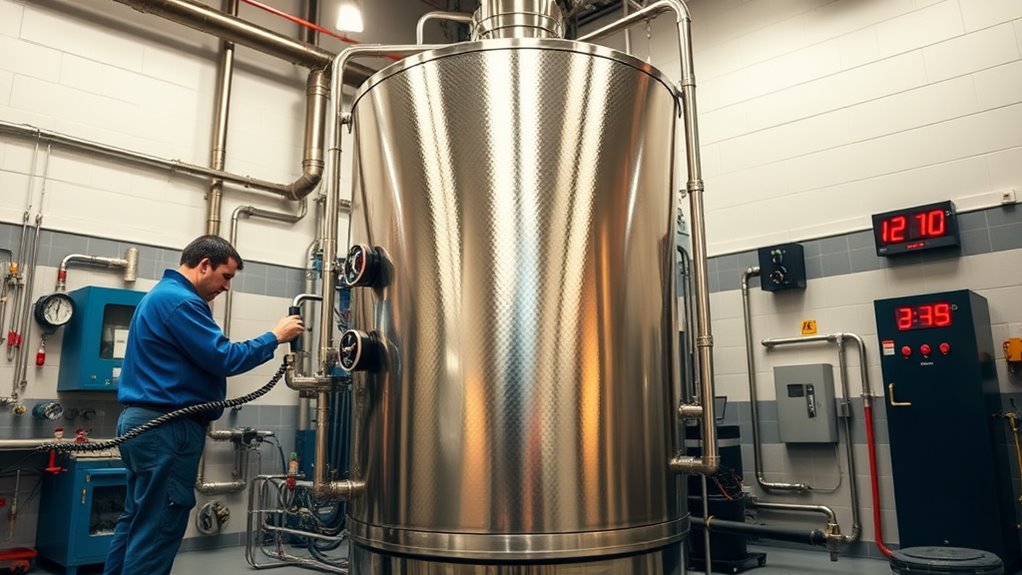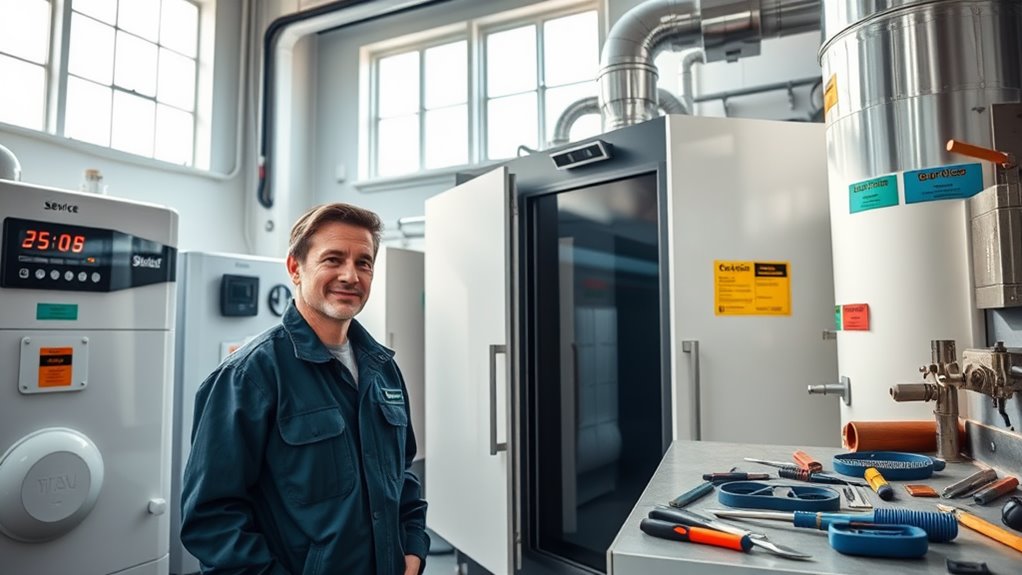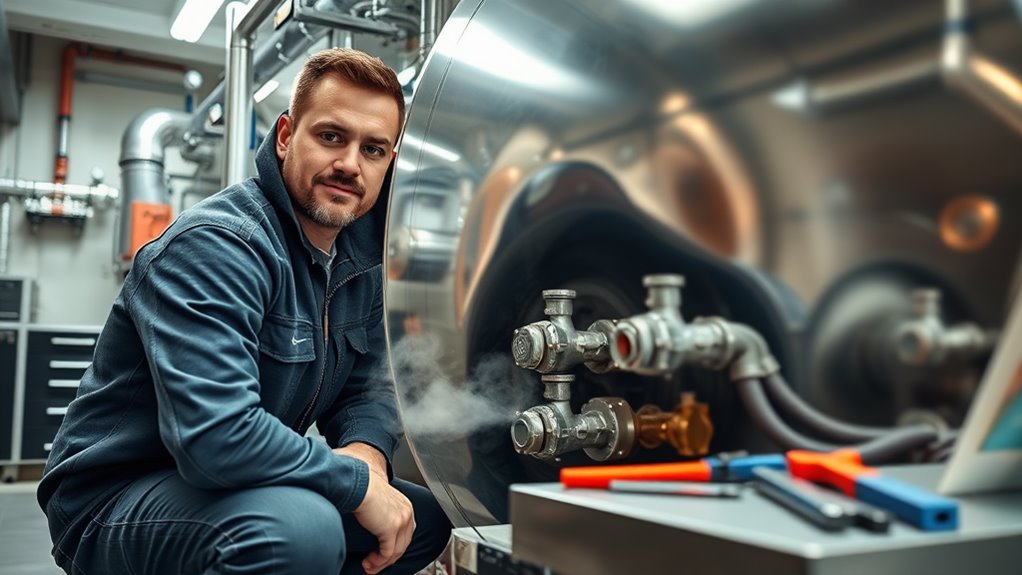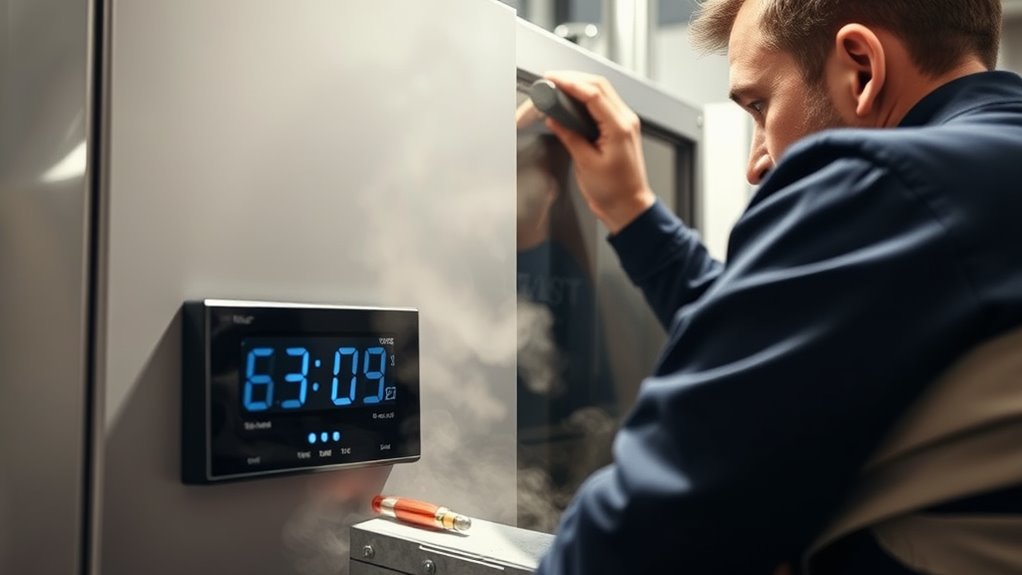Servicing a commercial boiler typically takes between one to three hours, depending on the type and condition of the unit. Gas boilers generally require less time, while oil boilers may take longer due to additional complexities. Factors like technician experience, boiler accessibility, and maintenance history can also affect service duration. Regular servicing is vital for efficiency and safety. Discover more about essential maintenance tasks and how they impact service time.
Key insights
- Service duration varies by boiler type, typically taking one to two hours for gas and one and a half to three hours for oil boilers.
- Technician experience significantly impacts service time, with seasoned professionals able to diagnose and resolve issues more quickly.
- Larger boilers usually require more time for servicing due to their complexity and component accessibility challenges.
- Regular maintenance and inspections can reduce service time by identifying potential issues before they escalate into major repairs.
- Factors such as boiler condition and accessibility of components can extend the overall service duration significantly.
Types of Commercial Boilers

When it comes to commercial boilers, understanding the various types is essential for efficient operation and maintenance. You'll encounter several boiler types, each suited for specific commercial applications. For instance, fire-tube boilers are popular for their simplicity and efficiency, making them ideal for smaller operations. Water-tube boilers, on the other hand, excel in high-pressure environments and larger facilities due to their ability to produce steam quickly. Condensing boilers are energy-efficient choices that recover heat from exhaust gases, perfect for reducing operational costs. Finally, electric boilers are compact and versatile, often used in environments where gas supply is limited. Knowing these boiler types will help you select the right system for your needs and guarantee peak performance. Additionally, considering the installation of commercial heat pumps can provide an energy-efficient heating and cooling solution for your facility.
Factors Affecting Service Time

While several factors influence how long it takes to service a commercial boiler, the type of boiler plays an essential role. Other elements also greatly impact the service time:
- Service Frequency: Regular maintenance can reduce overall service time.
- Technician Experience: A seasoned technician can identify issues faster.
- Boiler Size: Larger boilers typically require more time to service.
- Accessibility: Difficult-to-reach components can extend service duration.
- Condition of the Boiler: Older or poorly maintained systems may need more extensive work. Regular servicing ensures safe and efficient operation, which can also streamline the servicing process.
Understanding these factors helps you anticipate service times and schedule maintenance effectively. By prioritizing regular servicing and working with experienced technicians, you can optimize your boiler's performance and reduce downtime.
Typical Service Duration by Boiler Type

When servicing commercial boilers, the type of fuel used greatly impacts the time required for maintenance. Gas boilers typically require less time for servicing compared to oil boilers, which often involve more complex procedures. Understanding these differences can help you plan your maintenance schedule more effectively. Regular maintenance is critical for peak boiler performance to ensure efficiency and longevity.
Gas Boiler Service Time
Understanding the service time for gas boilers is vital for maintaining efficiency and safety in commercial settings. Typically, servicing a gas boiler takes between one to two hours, depending on the specific model and condition. Regular service intervals are essential to guarantee maximum boiler efficiency and to prevent potential issues.
Here are some key factors influencing service time:
- Type of gas boiler (e.g., standard, condensing)
- Boiler age and condition
- Complexity of the system components
- Manufacturer's recommendations
- Technicians' expertise and equipment
Moreover, regular maintenance is crucial for identifying leaks and ensuring compliance with safety regulations.
Oil Boiler Service Duration
Servicing an oil boiler typically requires a bit more time than servicing a gas boiler, often ranging from one and a half to three hours. This duration is essential for guaranteeing ideal oil boiler efficiency and thorough oil boiler maintenance. During the service, technicians inspect various components, including the burner, fuel lines, and filters. They also check for leaks and confirm proper combustion settings. Regular maintenance helps to identify potential issues before they escalate, ultimately extending the life of your boiler. It's important to schedule these services at least once a year, as neglect can lead to decreased efficiency and higher fuel costs. By prioritizing timely servicing, you'll maintain a reliable and efficient heating system. Additionally, regular maintenance is crucial for maintaining system efficiency in commercial settings.
Essential Maintenance Tasks

To guarantee your commercial boiler operates efficiently, you'll need to focus on essential maintenance tasks. Regular inspections help identify potential issues before they escalate, while thorough cleaning and flushing keep the system running smoothly. Additionally, adhering to a parts replacement schedule minimizes downtime and extends the lifespan of the boiler. Regular inspections are also crucial for maintaining ongoing compliance and safety, ensuring that the boiler meets Commercial Gas Safety Certificate standards.
Regular Inspections Importance
While commercial boilers are built to withstand heavy use, regular inspections are essential for maintaining their efficiency and longevity. Adhering to a proper inspection frequency guarantees that potential issues are identified early, preventing costly breakdowns. Here are some key inspection benefits:
- Enhanced Safety: Reduces risks of leaks or malfunctions.
- Improved Efficiency: Guarantees peak performance, reducing energy costs.
- Extended Lifespan: Regular checks prolong equipment life, delaying replacement.
- Regulatory Compliance: Meets local codes and standards, avoiding penalties.
- Minimized Downtime: Addresses issues before they escalate, guaranteeing continuous operation. Additionally, regular inspections ensure compliance with safety regulations, which is critical for the safe operation of gas-powered systems.
Cleaning and Flushing
Regular inspections set the stage for effective maintenance, but cleaning and flushing your commercial boiler are equally important tasks that shouldn't be overlooked. Utilizing appropriate cleaning techniques, like chemical descaling or mechanical brushing, helps remove scale and sludge buildup that can impair efficiency. Regularly scheduled cleaning keeps your boiler operating at peak performance, reducing the risk of costly breakdowns. Flushing methods, such as power flushing, effectively remove debris and contaminants from the system, promoting better circulation and heat transfer. Implementing these tasks not only extends your boiler's lifespan but also enhances its reliability and efficiency. To maximize effectiveness, guarantee these cleaning and flushing procedures are carried out by trained professionals who understand the specific requirements of your boiler system. Additionally, regular maintenance can prevent issues like the Ea error code, ensuring your boiler operates smoothly.
Parts Replacement Schedule
Guaranteeing your commercial boiler runs efficiently requires a well-defined parts replacement schedule, as worn components can lead to decreased performance and increased energy costs. By monitoring parts lifespan and recognizing replacement indicators, you can maintain peak operation. Here's a suggested schedule for essential replacements:
- Burners: Every 5-7 years, depending on usage.
- Heat Exchangers: Check annually; replace if corrosion or scaling is evident.
- Pumps: Inspect every 2 years; replace if noise or leakage occurs.
- Controls and Sensors: Test annually; replace if erratic readings are noted.
- Valves: Examine every 3 years; replace if leakage is detected.
Additionally, regular preventative maintenance can help in identifying issues before they lead to significant failures. Adhering to this schedule will guarantee your boiler's efficiency and longevity.
Importance of Regular Servicing

When you prioritize regular servicing of your commercial boiler, you not only enhance its efficiency but also extend its lifespan. This maintenance guarantees peak energy efficiency, allowing your boiler to operate at peak performance and reduce operational costs. Regular checks help identify potential issues before they escalate, saving you from costly repairs down the line. Additionally, consistent servicing keeps your system in line with safety compliance regulations, protecting your employees and facility from hazards associated with malfunctioning equipment. By committing to a maintenance schedule, you not only safeguard your investment but also contribute to a safer, more productive working environment. Remember, a well-serviced boiler is a reliable boiler. Regular maintenance and servicing prevent boiler errors and ensure optimal performance.
Signs Your Boiler Needs Immediate Attention
A commercial boiler showing signs of distress can lead to serious operational issues if not addressed promptly. You should be vigilant for the following signs that indicate your boiler needs immediate attention:
- Unusual boiler noises, like banging or hissing
- Significant pressure drops that affect performance
- Visible leaks or water pooling near the unit
- Fluctuating temperature readings in the system
- A sudden increase in energy bills
These symptoms can indicate underlying problems that could escalate if left untreated. Don't ignore these warning signs; addressing them quickly can prevent costly repairs and guarantee the boiler operates efficiently. Regular monitoring will help you maintain ideal performance and safety for your commercial operations.
Planning for Boiler Servicing
Proper planning for boiler servicing is essential to maintaining efficiency and prolonging the lifespan of your commercial unit. Begin by evaluating your boiler's operational history and identifying any recurring issues. Establish a routine maintenance schedule, ideally in alignment with manufacturer recommendations. Consider entering into service contracts with qualified technicians who specialize in commercial boilers; these contracts can guarantee timely inspections and repairs, enhancing boiler efficiency. Keep detailed records of servicing activities to track performance trends and identify potential problems early. Additionally, plan for potential downtime during servicing to minimize disruptions to your operations. By implementing these strategies, you'll help guarantee your boiler remains in peak condition, ultimately saving costs and improving overall productivity.
Consequences of Neglecting Maintenance
Neglecting routine maintenance on your commercial boiler can lead to significant operational setbacks and financial losses. When you overlook maintenance, you risk:
- Decreased efficiency, causing higher energy bills
- Increased likelihood of breakdowns, resulting in costly repairs
- Shortened lifespan of the boiler, leading to premature replacement
- Safety hazards, which could endanger employees and property
- Non-compliance with regulations, potentially incurring fines
Ignoring these aspects not only affects the neglected efficiency of your boiler but can also disrupt your business operations. Regular maintenance helps guarantee peak performance, reduces the risk of unexpected failures, and ultimately saves you money in the long run. Don't wait for a breakdown; prioritize maintenance to keep your boiler running smoothly and effectively.
Frequently Asked Questions
Can I Service My Commercial Boiler Myself?
You can attempt DIY maintenance on your commercial boiler, but it's essential to understand the safety regulations involved. Many systems require specialized knowledge and tools, so self-servicing may not be advisable. If you're not familiar with the components and potential hazards, you could risk safety violations or damage to the unit. Always prioritize safety and consider hiring a certified professional to guarantee compliance with regulations and proper functioning of your boiler.
How Often Should I Schedule Boiler Servicing?
You should schedule boiler servicing at least once a year to guarantee peak performance and safety. This boiler maintenance frequency helps identify potential issues early, reducing the risk of costly repairs. Set up servicing reminders to stay on track, especially before peak usage seasons. Regular maintenance not only extends your boiler's lifespan but also enhances energy efficiency, ultimately saving you money in the long run. Prioritize this aspect of your building's upkeep for peace of mind.
What Qualifications Should a Technician Have?
When selecting a technician, it's essential to take into account their qualifications. Look for certification requirements, like those from recognized trade organizations, ensuring they've met industry standards. Additionally, evaluate the technician's experience, as hands-on knowledge is important for effective servicing. A well-qualified technician not only understands the technical aspects but also anticipates potential issues, contributing to a safer and more efficient boiler operation. Always verify their credentials before hiring.
Is Servicing Covered Under My Warranty?
You should check your warranty coverage details to see if servicing is included. Many warranties require regular maintenance to remain valid, often specifying servicing frequency. If your warranty states that maintenance is necessary, it's essential to stay compliant to avoid potential voiding. Always document your servicing to guarantee you can provide proof if any issues arise. Understanding these conditions will help you maximize the benefits of your warranty while keeping your equipment running efficiently.
What Are the Costs Associated With Boiler Servicing?
Boiler maintenance costs vary based on factors like your location, the boiler type, and service frequency. Typically, you might pay between $150 to $500 per service visit. Additionally, consider service contract options that offer routine inspections and emergency repairs, often at a lower overall cost. These contracts can help you budget for maintenance while ensuring your boiler operates efficiently. Always evaluate multiple providers to find the best value for your needs.
Summary
In summary, understanding the service time for your commercial boiler is vital for maintaining efficiency and safety. By recognizing the types of boilers, essential maintenance tasks, and factors that affect service duration, you can better plan for regular servicing. Don't overlook signs that indicate your boiler needs attention; addressing issues promptly can prevent costly repairs. Prioritizing maintenance not only extends your boiler's lifespan but also guarantees peak performance, ultimately safeguarding your business operations.

